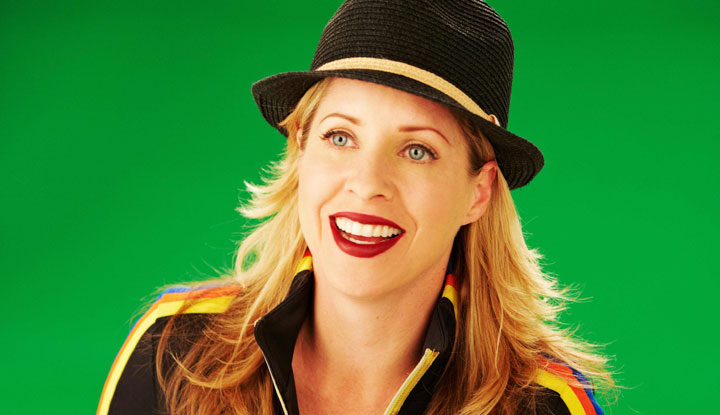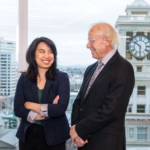In the latest installment of Success Stories, a series highlighting the personal and professional journeys of some of the most dynamic entrepreneurs, YFS Magazine speaks with Tiffany Shlain founder of The Webby Awards and The Moxie Institute, a San Franciscco-based film studio and lab that aims to produce cutting edge films for the 21st century.
At the intersection of technology, filmmaking and social good you’ll find one woman standing at the forefront — entrepreneur Tiffany Shlain. Shlain gained notoriety in 1996 after founding The Webby Awards, an international award honoring excellence on the Internet. Two years later she co-founded the International Academy of Digital Arts and Sciences to drive creative, technical, and professional progress of the Internet and new media.
After spending nearly a decade honoring people using the Web, Shlain considered that she had more to contribute to global conversations, outside of technology. In 2005, she sold The Webby Awards to focus on a childhood passion — filmmaking.
“When I was young, I was really interested in film. I used to go see a movie every week with my parents. I was also really into computers,” Shlain explains. “I got a Macintosh in 1984 and I loved the potential of computers. Throughout my life, I’ve gone back and forth between film and technology.”
Today, as the founder and CEO of The Moxie Institute, Shlain creates films combined with social action. Her entrepreneurial endeavors continue to solidify her role as a fixture across both tech and entertainment industries. Her work has been profiled in The New York Times, BBC, ABC, MTV, CNN, The Hollywood Reporter, Vanity Fair and NPR.
Learn how Tiffany Shlain transitioned from technology to filmmaking and why she believes experimentation is at the core of entrepreneurship.
| Company: | The Moxie Institute |
| Founder(s): | Tiffany Shlain |
| Location: | San Francisco, CA |
| Industry: | Film and Entertainment |
| Startup Year: | 2005 |
| Startup Costs | Undisclosed |
How I Got Started
When I was young, I was really interested in film. I used to go see a movie every week with my parents. I was also really into computers. I got a Macintosh in 1984 and I loved the potential of computers. Throughout my life, I’ve gone back and forth between film and technology.
I was always interested in both film and technology. I used to work in technology to pay for my films and then I was given the opportunity to create The Webby Awards in 1996, which was very exciting. I had an amazing experience honoring people with that [platform]. I would make short films during the ceremony about how technology was changing our lives. In 2004, I really realized I wanted to make films about important issues of our day combined with the power of the web to make change.
So, in 2005 I sold The Webby Awards to fund my film studio, [The Moxie Institute]. After spending nearly ten years honoring people using the web, I really wanted to make films combined with social action.
Right now we have eight films either in theaters, on television, playing at conferences or used in schools. They all have websites that accompany them and discussion kits [to help viewers share their ideas and opinions post-viewing]. For example, we have a feature film Connected that’s was in theaters and now is on iTunes and Netflix; it explores the good, bad and potential of technology and connectedness.
We make films on how technology is changing our lives, and we do a lot of experiments with new technologies to expand how we tell stories and share ideas — and engage people in important discussions of the 21st century.
For example, we have a new AOL film series launching this Fall called The Future Starts Here, [among other projects in the works]. I was approached by AOL to do [this film] series on whatever was interesting to me.
I’m always interested in people talking so much about the future, [but the idea that] really we’re always one minute from the future. I’m also interested in the past and looking at history. And then I’m very interested in what’s happening today… [in the context of], “what is the good, the bad and the potential of all of these new technologies?”
So it seemed like a really exciting framework to pursue [a variety of topics] that I’m interested in — from being a working mother to robotics, tech etiquette [and related subjects]. My work with these collaborative films, which I call Cloud Filmmaking, is the first time [my two interests] really merged.
Best Success Story
Our feature documentary Connected premiered at Sundance and has won 15 awards. It was also selected by the US State Department as one of the films to represent America in the American Film Showcase. So they sent me to Cape Town, South Africa for film screenings and discussions.
My goal with that film was to trigger a global conversation about connectedness, so that was really a great honor. Every day, I get emails from people who have seen [Connected] on Netflix or iTunes. [The film is] being used at over one hundred universities all over the world. It’s very exciting to see the reach of that film.
Biggest Startup Challenge
Finding the right environment for us to work in [was challenging]. Right now, we’re on a whole floor with tech startups; there’s a big common space and everyone has their individual offices. I feel like it’s just the perfect environment to create.
#1 Tip for Entrepreneurs
Experiment. I feel like entrepreneurship is really about creating an environment for experimentation.
Stay connected with Tiffany on Twitter.
This interview has been edited and condensed. Interview conducted by writer, Katherine Burks.
© YFS Magazine. All Rights Reserved. Copying prohibited. All material is protected by U.S. and international copyright laws. Unauthorized reproduction or distribution of this material is prohibited. Sharing of this material under Attribution-NonCommercial-NoDerivatives 4.0 International terms, listed here, is permitted.










